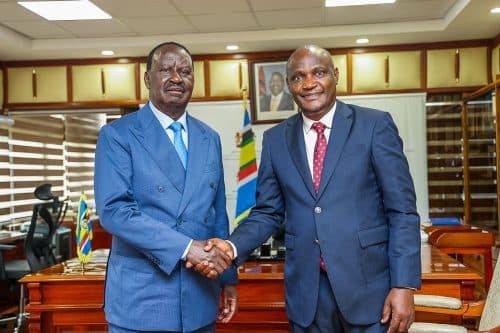We're loading the full news article for you. This includes the article content, images, author information, and related articles.
Treasury Cabinet Secretary John Mbadi has returned to Kenya from official engagements in the United States to join the nation in mourning the passing of former Prime Minister Raila Odinga, highlighting the profound impact of Odinga's death on Kenya's political landscape

Treasury Cabinet Secretary John Mbadi abruptly concluded his official duties in Washington, D.C., United States, to return to Kenya and participate in the national mourning of former Prime Minister Raila Odinga. Mbadi was leading a delegation from the Ministry of Finance at the ongoing International Monetary Fund (IMF) and World Bank Annual Meetings when news of Odinga's death reached him on Wednesday, October 15, 2025.
In a statement released on his X page on Friday, October 17, 2025, CS Mbadi expressed his profound grief, stating, “Safely landed back in the country to join Kenya, Africa, and the world in mourning the Enigma, Baba Rt. Hon Raila Odinga. This is undeniably one of the most difficult moments in my life. May your beautiful soul rest in peace Baba.” He further acknowledged Odinga's pivotal role in shaping his political career, describing the sudden loss as deeply personal.
Raila Odinga, a towering figure in Kenyan politics, passed away on Wednesday, October 15, 2025, at the age of 80, in Kerala, India, due to cardiac arrest. His death has elicited an outpouring of tributes from leaders across the political spectrum, with President William Ruto describing him as a visionary leader and fearless defender of democracy. Odinga's political career spanned decades, marked by his relentless fight for justice, democracy, and good governance.
Mbadi's return is particularly significant given his close political ties to Odinga. He is among several 'experts' from Odinga's Orange Democratic Movement (ODM) party who were appointed to government positions following a pact signed between ODM and President William Ruto's Kenya Kwanza government in March 2025. This agreement, signed at the Kenyatta International Convention Centre (KICC) in Nairobi, aimed to foster collaboration on critical government policies and enhance inclusivity.
The pact between Kenya Kwanza and ODM, formalised on Friday, March 7, 2025, represented a significant political realignment, with implications for governance and policy direction. The agreement included commitments to fully implement the National Dialogue Committee (NADCO) report, address youth unemployment, and implement the two-thirds gender rule. It also sought to promote leadership integrity, curb opulence among leaders, and establish a legal framework to address conflicts of interest within government institutions.
Critics, however, raised concerns that the pact might erode the role of the parliamentary opposition, drawing parallels to the 2018 'handshake' between Odinga and former President Uhuru Kenyatta. Despite these concerns, proponents argued that the collaboration could temper Kenya Kwanza's economic policies, which had faced public unrest due to tax hikes, by integrating ODM's social welfare ethos.
CS Mbadi's personal testimony underscores the deep impact Odinga had on many political careers. Mbadi, who has served as the Cabinet Secretary for the National Treasury and Economic Planning since August 8, 2024, has an extensive background in public service and finance. His career includes serving as a nominated Member of Parliament and Chairperson of the Public Accounts Committee in the National Assembly. His decision to cut short an international assignment reflects the widespread sentiment of loss felt by those who worked closely with Odinga.
Other leaders, including President Ruto and Deputy President Kithure Kindiki, have also offered heartfelt tributes, acknowledging Odinga's patriotic and revolutionary leadership. The outpouring of grief from thousands of mourners who gathered at Jomo Kenyatta International Airport to receive Odinga's body further illustrates the profound national impact of his passing.
The death of Raila Odinga creates a significant leadership vacuum within Kenya's political opposition, particularly ahead of the 2027 general elections. While the Kenya Kwanza-ODM pact aimed to foster unity, Odinga's absence could trigger new political realignments and potentially destabilize the delicate balance achieved through the agreement. The ODM party now faces an urgent need to address leadership succession, a process that could introduce internal divisions.
The immediate focus will be on the funeral arrangements for Raila Odinga and the national period of mourning. Following this, attention will shift to the Orange Democratic Movement's strategy for leadership succession and how this will impact the ongoing pact with the Kenya Kwanza government. The political landscape is likely to see significant shifts as various factions vie for influence in the post-Odinga era. The implementation of the agreements outlined in the Kenya Kwanza-ODM pact will also be closely monitored to see if the spirit of collaboration endures without Odinga's direct involvement.
Keep the conversation in one place—threads here stay linked to the story and in the forums.
Sign in to start a discussion
Start a conversation about this story and keep it linked here.
Other hot threads
E-sports and Gaming Community in Kenya
Active 9 months ago
The Role of Technology in Modern Agriculture (AgriTech)
Active 9 months ago
Popular Recreational Activities Across Counties
Active 9 months ago
Investing in Youth Sports Development Programs
Active 9 months ago
Key figures and persons of interest featured in this article